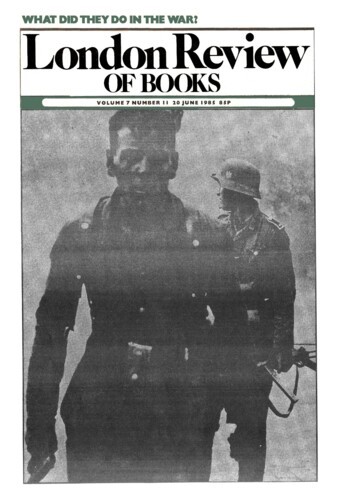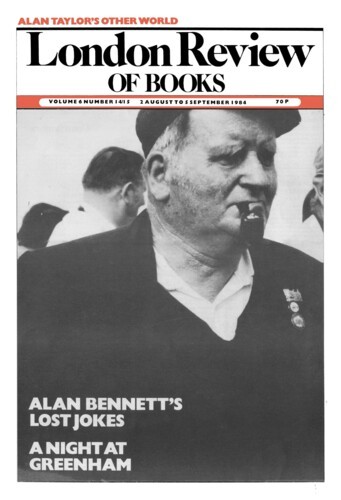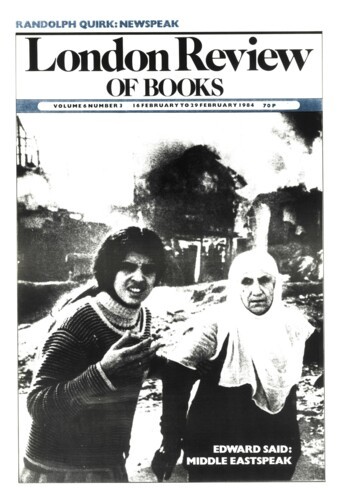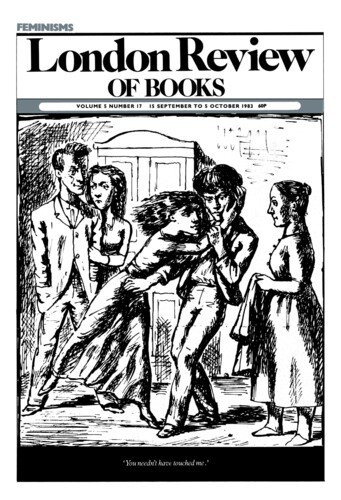Dan Jacobson
Dan Jacobson, who died in 2014, was a novelist and a professor of English at UCL.
Paralysing posterity
Dan Jacobson, 20 June 1985
Times change. If, at the beginning of the 19th century, you wanted to suggest that the pillory and the gallows were inappropriate punishments to inflict on those found guilty of committing homosexual acts, you had to make it clear that you did so in spite of your horror at the moral abominations you were speaking of. Nowadays, if you want to express misgivings at the news that the Modern Languages Association of America has a Division of Gay Studies, you have to be at pains to insist that your misgivings are purely literary and intellectual in character.
Angela and Son
Dan Jacobson, 2 August 1984
The most interesting parts of the lives of writers often enough take place before they become writers. In Colin MacInnes’s case, one might say that some of the most interesting parts of his life took place before he was born. He was the great-grandchild of the Pre-Raphaelite painter, Edward Burne-Jones, and was thus connected with both the Kipling and the Baldwin families; he was the grandson of an Oxford Professor of Poetry (of no great distinction, it must be admitted); and the son of Angela Thirkell, the novelist of upper-class English life, and James Campbell McInnes, a man of working-class origins who became the foremost British lieder-singer of his generation. Unfortunately for this marriage of the muses and the classes, Campbell McInnes was also drunken, violent, and (though he succeeded in fathering three children by Angela Thirkell, and then in raping the children’s nursemaid) inveterately homosexual.
The Boer-Lover
Dan Jacobson, 16 February 1984
Like all the older people among my mother’s family connections, M. was an immigrant to South Africa from Eastern Europe. He had arrived in the country as a boy and had grown up in Johannesburg. Unlike virtually every other Jewish immigrant, however, he had chosen to identify himself not with the urban, prosperous, relatively sophisticated English-speaking section of the population, but with the Boers, the Afrikaners. As a group they may have had the reputation, at least among outsiders, of being provincial, unwelcoming, defiantly illiberal and racialistic, isolated from the rest of the world as much by their attitudes and language as by their geographical situation. Indeed, when my two older brothers and I lived briefly under M.’s roof, more than forty years ago, a substantial number of the Afrikaners sided more or less openly with the Nazis in Germany. Yet it was with them that he sought to associate himself; it was with their fortunes that he had tied his own. Tied it to the extent of marrying an Afrikaner woman and bringing up his children to speak Afrikaans. For years his mother had refused to see him, as a result.
Punishment
Dan Jacobson, 15 September 1983
Three autobiographical books by three Soviet dissidents who are as unlike one another in character, background and way of life as it is possible to be. The first of the authors is a solemn, Jewish lady-lawyer; the second an irascible Red Army general; the third (until his death recently in a car crash) was a contumacious bohemian of vagrant habits and wide-ranging intellectual interests. One of the many things that make their books so depressing to read, however, is that the same incidents and people recur in all three of them: indeed, each of the authors appears in the others’ books, though not always by name. Thus, quite unintentionally and inadvertently, they reveal just how small was the society of dissidents, and how limited in number were the protests they managed to mount, even in the great days of the ‘Movement’, in the late Sixties and early Seventies.
Pieces about Dan Jacobson in the LRB
Uninfatuated: Dan Jacobson
Tessa Hadley, 20 October 2005
‘If anthropology is obsessed with anything,’ Clifford Geertz says, ‘it is with how much difference difference makes.’ The same could be said of the novel. And...
The Old Country: the troublesome marriage of Poles and Jews
Thomas Laqueur, 4 June 1998
Both these books are about recovering and redeeming a past: the past of Dan Jacobson’s grandfather, Heshel Melamed, the rabbi of a community of Jews in the obscure Lithuanian village of...
Pale Ghosts
Jeremy Harding, 12 January 1995
Dan Jacobson grew up in the diamond town of Kimberley, South Africa. England was one of the places he looked to for inspiration. As it turned out, his interest in English literature and his habit...
Intolerance
Julian Symons, 8 October 1992
A parable, an allegory, a moral fable, must convince us first on the literal level to have full effect in its symbolic message. In ‘The Metamorphosis’ and The Trial our attention is...
Word-Processing
Stephen Wall, 12 September 1991
There have always been novels with a highly developed sense of their own means of production. When, at the end of Mansfield Park, Jane Austen said she’d let other pens dwell on guilt and...
Nuvvles
Stephen Wall, 16 March 1989
Novelists on the novel – or, at any rate, good novelists on the novel – often write with a vigour and a commitment to the form that shames more academic approaches. Such...
Falling in love with the traffic warden
John Bayley, 1 October 1987
Patrick Hamilton is remembered today, if at all, for the short pre-war novel Hangover Square, and the stage thrillers Rope and Gaslight. They are good of their kind, but they lack the feel of...
Dan’s Fate
Craig Raine, 3 October 1985
In Speak, Memory, the five-year-old Nabokov is led down from the nursery in 1904 to meet a friend of the family, General Kuropatkin. To amuse me, he spread out a handful of matches on the divan...
The Bible as Fiction
George Caird, 4 November 1982
When three distinguished literary figures are impelled to write about the Bible, it is clear that this strange library of books has lost nothing of its perennial fascination. All three grapple...
Read anywhere with the London Review of Books app, available now from the App Store for Apple devices, Google Play for Android devices and Amazon for your Kindle Fire.
Sign up to our newsletter
For highlights from the latest issue, our archive and the blog, as well as news, events and exclusive promotions.




